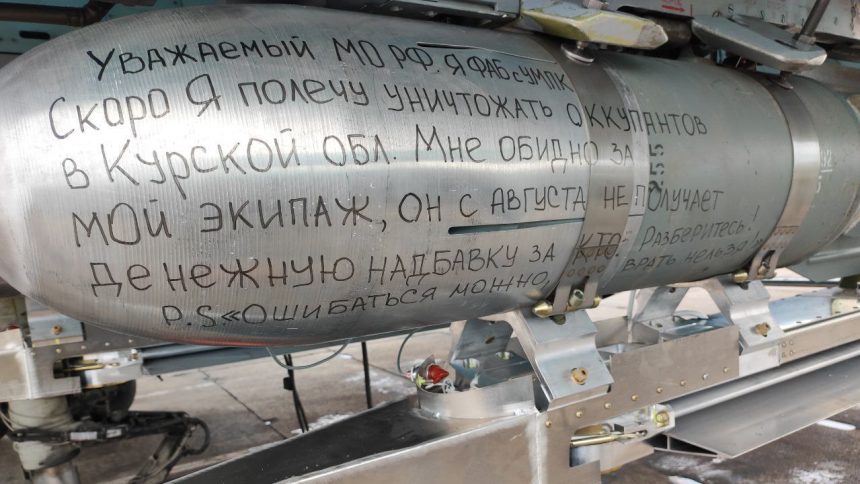In an unprecedented protest, Russian military personnel have found a unique way to voice their frustrations over unpaid bonuses: inscription on a glide bomb.
As is occasionally seen also in Western air forces during both real operations and live-fire exercises, bombs may feature various inscriptions. Historically, such messages are reserved for the enemy, often containing insults, challenges, names of fallen comrades to avenge or a city to be conquered. For instance, in 2015, during drills at Kaliningrad Oblast, transport planes of the Russian Baltic Fleet used practice bombs signed “To Berlin!” and “For Stalin!” reminiscent of the messages Soviet Red Army forces wrote on munitions during World War II in their campaign against Nazi Germany,
However, for the first time, a bomb has recently become a protest banner, directed not at external foes but at Russia’s own leadership.
A post on X by a pro-Ukrainian account shows an image UMPK-equipped 250kg-class OFAB-250 bomb with a message from Russian personnel fighting against Ukraine.
Well that’s a new one. Pilots of a Russian bomber left an appeal to the Ministry of Defence written on a glide bomb complaining about lack of bonus pay for bombing their own country:
“Dear Ministry of Defence, I’m FAB with UMPK.
Soon I will fly to destroy occupiers in Kursk Obl.… pic.twitter.com/dvK2O4ds6U
— WarTranslated (Dmitri) (@wartranslated) October 22, 2024
The image in the post shows the munition on which a message was written, that translates from Cyrillic as follows:
Dear Ministry of Defence, I’m FAB with UMPK. Soon I will fly to destroy occupiers in Kursk Obl. I’m upset for my crew, they have not received bonus pay for counter-terrorist operation since August. Sort it out!
P.S. You can make mistakes, but you can’t lie.
The most striking part of the message is the Post Scriptum: “You can make mistakes, but you cannot lie,” a phrase is particularly biting as it echoes the statement made by Defense Minister Andrei Belusov during his inauguration speech on May 14, from the stand of the Federation Council, the upper chamber of the Russian parliament, where he started his tenure with a bold statement:
“I have always been guided by the principle, the reinforced concrete principle: you can make mistakes, you can’t lie”
Although the undated image shared online has not initially been independently verified, its veracity has been confirmed by the famous FighterBomber milblogger on Telegram.
The anonymous airmen are essentially demanding the payment of the bonuses promised to those participating in Russia’s so-called “Special Military Operation,” as the Kremlin refers to the invasion and war in Ukraine. According to media reports, the bonuses provided for each active period on the front lines may not be recognized for those officially stationed in Russian territories, such as the Kursk region mentioned in the bomb’s inscription
The bomb used for this protest, is equipped with the UMPK (Russian: УМПК; Унифицированный модуль планирования и коррекции, or Unified Gliding and Correction Module) a guidance kit initially developed by Russia’s Bazalt Design Bureau to transform unguided Soviet-era bombs into precision-guided weapons. This kit functions as a glide range extension system for aerial bombs, comparable to the U.S. Joint Direct Attack Munition Extended Range (JDAM-ER). The UMPK kit uses satellite navigation and an inertial measurement unit to guide the bomb. By using the UMPK, standard bombs gain improved range and accuracy: the larger variants can be launched from 30-40 kilometers away from their targets.
Moscow started relying more on glide bombs beginning in early 2023. These weapons helped Russia make up for a shortage of tactical air-launched missiles and avoid using free-fall bombs, which put their pilots at higher risk of being shot down.
The protest bomb is a striking reminder of the broader challenges faced by Russia’s military personnel. The Kremlin has promised significant financial rewards for those participating in the war, but bureaucratic hurdles, delays, and a lack of transparency have led to growing frustration among those on the front lines. These issues are compounded by the fact that many of the promised benefits seem to be withheld for missions within Russian territory, such as in the Kursk region, despite the intense fighting taking place there.
In the end, the episode shows just how fed up some Russian troops are. The sarcastic message scribbled on the bomb doesn’t just complain about unpaid wages; it takes a direct shot at their leadership. By quoting Defense Minister Belusov’s own line the pilots and the rest of the personnel are basically calling out what they see as hypocrisy in the promises made to them.
This “incident” highlights the tensions brewing within Russia’s military as the war drags on, with morale and trust in their leaders being pushed to the limit. Whether this bold move will result in any real action or response from the Russian government is unclear, but it’s definitely sparked some conversation and shone a light on the growing frustration among soldiers on the front lines.









